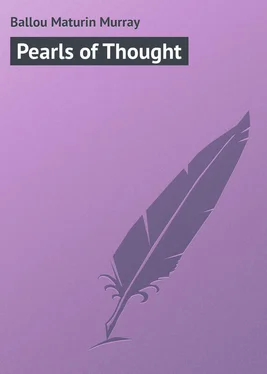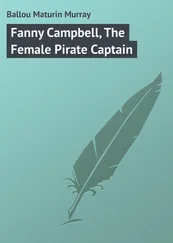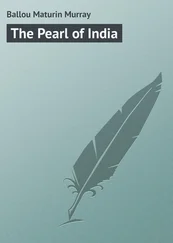Maturin Ballou - Pearls of Thought
Здесь есть возможность читать онлайн «Maturin Ballou - Pearls of Thought» — ознакомительный отрывок электронной книги совершенно бесплатно, а после прочтения отрывка купить полную версию. В некоторых случаях можно слушать аудио, скачать через торрент в формате fb2 и присутствует краткое содержание. Жанр: foreign_prose, foreign_language, на английском языке. Описание произведения, (предисловие) а так же отзывы посетителей доступны на портале библиотеки ЛибКат.
- Название:Pearls of Thought
- Автор:
- Жанр:
- Год:неизвестен
- ISBN:нет данных
- Рейтинг книги:5 / 5. Голосов: 1
-
Избранное:Добавить в избранное
- Отзывы:
-
Ваша оценка:
- 100
- 1
- 2
- 3
- 4
- 5
Pearls of Thought: краткое содержание, описание и аннотация
Предлагаем к чтению аннотацию, описание, краткое содержание или предисловие (зависит от того, что написал сам автор книги «Pearls of Thought»). Если вы не нашли необходимую информацию о книге — напишите в комментариях, мы постараемся отыскать её.
Pearls of Thought — читать онлайн ознакомительный отрывок
Ниже представлен текст книги, разбитый по страницам. Система сохранения места последней прочитанной страницы, позволяет с удобством читать онлайн бесплатно книгу «Pearls of Thought», без необходимости каждый раз заново искать на чём Вы остановились. Поставьте закладку, и сможете в любой момент перейти на страницу, на которой закончили чтение.
Интервал:
Закладка:
Argument.– There is no arguing with Johnson; for if his pistol misses fire he knocks you down with the butt end of it. — Goldsmith.
Weak arguments are often thrust before my path; but although they are most unsubstantial, it is not easy to destroy them. There is not a more difficult feat known than to cut through a cushion with a sword. — Bishop Whately.
Treating your adversary with respect is giving him an advantage to which he is not entitled. The greatest part of men cannot judge of reasoning, and are impressed by character; so that if you allow your adversary a respectable character, they will think that, though you differ from him, you may be in the wrong. Treating your adversary with respect is striking soft in a battle. — Johnson.
The soundest argument will produce no more conviction in an empty head than the most superficial declamation; as a feather and a guinea fall with equal velocity in a vacuum. — Colton.
An ill argument introduced with deference will procure more credit than the profoundest science with a rough, insolent, and noisy management. — Locke.
One may say, generally, that no deeply rooted tendency was ever extirpated by adverse argument. Not having originally been founded on argument, it cannot be destroyed by logic. — G. H. Lewes.
A reason is often good, not because it is conclusive, but because it is dramatic, – because it has the stamp of him who urges it, and is drawn from his own resources. For there are arguments ex homine as well as ad hominem . — Joubert.
If I were to deliver up my whole self to the arbitrament of special pleaders, to-day I might be argued into an atheist, and to-morrow into a pickpocket. — Bulwer-Lytton.
Aristocracy.– And lords, whose parents were the Lord knows who. — De Foe.
What can they see in the longest kingly line in Europe, save that it runs back to a successful soldier? — Walter Scott.
If in an aristocracy the people be virtuous, they will enjoy very nearly the same happiness as in a popular government, and the state will become powerful. — Montesquieu.
An aristocracy is the true, the only support of a monarchy. Without it the State is a vessel without a rudder – a balloon in the air. A true aristocracy, however, must be ancient. Therein consists its real force, – its talismanic charm. — Napoleon.
I never could believe that Providence had sent a few men into the world, ready booted and spurred to ride, and millions ready saddled and bridled to be ridden. — Richard Rumbold.
Armor.– The best armor is to keep out of gunshot. — Lord Bacon.
Our armor all is strong, our cause the best; then reason wills our hearts should be as good. — Shakespeare.
Art.– Rules may teach us not to raise the arms above the head; but if passion carries them, it will be well done: passion knows more than art. — Baron.
It is a great mortification to the vanity of man that his utmost art and industry can never equal the meanest of nature's productions, either for beauty or value. Art is only the underworkman, and is employed to give a few strokes of embellishment to those pieces which come from the hand of the master. — Hume.
The mission of art is to represent nature; not to imitate her. — W. M. Hunt.
True art is not the caprice of this or that individual, it is a solemn page either of history or prophecy; and when, as always in Dante and occasionally in Byron, it combines and harmonizes this double mission, it reaches the highest summit of power. — Mazzini.
Art is the right hand of Nature. The latter has only given us being, the former has made us men. — Schiller.
Art does not imitate nature, but it founds itself on the study of nature – takes from nature the selections which best accord with its own intention, and then bestows on them that which nature does not possess, namely, the mind and the soul of man. — Bulwer-Lytton.
The mother of useful arts is necessity; that of the fine arts is luxury. — Schopenhaufer.
He who seeks popularity in art closes the door on his own genius, as he must needs paint for other minds and not for his own. — Washington Allston.
In art, form is everything; matter, nothing. — Heinrich Heine.
Strange thing art, especially music. Out of an art a man may be so trivial you would mistake him for an imbecile, at best a grown infant. Put him into his art, and how high he soars above you! How quietly he enters into a heaven of which he has become a denizen, and, unlocking the gates with his golden key, admits you to follow, an humble, reverent visitor. — Bulwer-Lytton.
Art does not imitate, but interpret. — Mazzini.
The artist is the child in the popular fable, every one of whose tears was a pearl. Ah! the world, that cruel step-mother, beats the poor child the harder to make him shed more pearls. — Heinrich Heine.
In art there is a point of perfection, as of goodness or maturity in nature; he who is able to perceive it, and who loves it, has perfect taste; he who does not feel it, or loves on this side or that, has an imperfect taste. — Bruyère.
Never judge a work of art by its defects. — Washington Allston.
Asceticism.– I recommend no sour ascetic life. I believe not only in the thorns on the rosebush, but in the roses which the thorns defend. Asceticism is the child of sensuality and superstition. She is the secret mother of many a secret sin. God, when he made man's body, did not give us a fibre too much, nor a passion too many. I would steal no violet from the young maiden's bosom; rather would I fill her arms with more fragrant roses. But a life merely of pleasure, or chiefly of pleasure, is always a poor and worthless life, not worth the living; always unsatisfactory in its course, always miserable in its end. — Theodore Parker.
In hope to merit heaven by making earth a hell. — Byron.
Three forms of asceticism have existed in this weak world. Religious asceticism, being the refusal of pleasure and knowledge for the sake – as supposed – of religion; seen chiefly in the Middle Ages. Military asceticism, being the refusal of pleasure and knowledge for the sake of power; seen chiefly in the early days of Sparta and Rome. And monetary asceticism, consisting in the refusal of pleasure and knowledge for the sake of money; seen in the present days of London and Manchester. — Ruskin.
Aspiration.– The negro king desired to be portrayed as white. But do not laugh at the poor African; for every man is but another negro king, and would like to appear in a color different from that with which Fate has bedaubed him. — Heinrich Heine.
There is no sorrow I have thought more about than that – to love what is great, and try to reach it, and yet to fail. — George Eliot.
The heart is a small thing, but desireth great matters. It is not sufficient for a kite's dinner, yet the whole world is not sufficient for it. — Quarles.
There must be something beyond man in this world. Even on attaining to his highest possibilities, he is like a bird beating against his cage. There is something beyond, O deathless soul, like a sea-shell, moaning for the bosom of the ocean to which you belong! — Chapin.
Oh for a muse of fire, that would ascend the brightest heaven of invention! A kingdom for a stage, princes to act, and monarchs to behold the swelling scene. — Shakespeare.
Читать дальшеИнтервал:
Закладка:
Похожие книги на «Pearls of Thought»
Представляем Вашему вниманию похожие книги на «Pearls of Thought» списком для выбора. Мы отобрали схожую по названию и смыслу литературу в надежде предоставить читателям больше вариантов отыскать новые, интересные, ещё непрочитанные произведения.
Обсуждение, отзывы о книге «Pearls of Thought» и просто собственные мнения читателей. Оставьте ваши комментарии, напишите, что Вы думаете о произведении, его смысле или главных героях. Укажите что конкретно понравилось, а что нет, и почему Вы так считаете.












